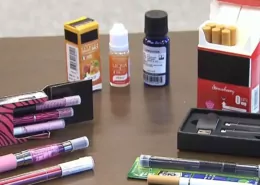Why Texas Taxes Cigarettes But Not Vaping Products
Texas imposes stiff taxes on traditional cigarettes yet has no targeted tax on vaping products. This tax structure contrasts with over 30 U.S. states that do tax vaping products. Here’s an in-depth look at Texas’ approach.
How Texas Defines Vaping Products
Texas considers vaping devices like e-cigarettes to be “battery-powered vaporizers that simulate tobacco smoking by producing an aerosol resembling smoke.” The aerosol is created by heating an e-liquid containing nicotine, flavors, vegetable glycerin, and propylene glycol.
While vapes don’t actually contain tobacco, the nicotine derives from tobacco plants. Therefore, Texas categorizes vaping products as tobacco products.
Cigarettes, meanwhile, involve rolls of tobacco wrapped in paper designed for smoking. The key difference lies in cigarettes containing tobacco while vapes only contain nicotine derived from tobacco.
Why No Vape Tax Despite Cigarette Tax
Texas levies significant taxes on cigarettes sold in the state. Packs of 20 cigarettes face a $1.41 tax, going up to $1.76 for 25-cig packs. The tax reaches $70.50 per 1,000 cigarettes for packs under 3 pounds.
However, none of these cigarette taxes apply to vaping products. As the Texas Comptroller’s office explains:
“E-cigarettes and e-liquids do not meet the statutory definition of a cigarette, so they are not subject to the cigarette tax.”
Because cigarettes and vaping products are defined differently in Texas tax code, vapes remain exempt from cigarette taxes. Efforts to specifically tax vaping products have failed to pass the state legislature so far.
What Regulations Exist For Vaping Products
While untaxed, vaping products still face some of the same regulations as cigarettes in Texas:
- Minimum Age: It’s illegal for retailers to sell vaping products to anyone under 21 years old after Texas implemented the federal Tobacco 21 law.
- Indoor Vaping Bans: Most indoor public spaces in Texas prohibit vaping similar to smoking bans. Some cities also ban vaping in outdoor venues.
- School Grounds: State law prohibits vaping on primary or secondary school property, just like smoking.
- State Licensing: Retailers and distributors of vaping products must obtain a state license and pay associated fees.
- Warning Labels: Vaping products must contain nicotine warning statements and conform to certain packaging standards.
So even without a vape tax, Texas does regulate the retail sale and use of vaping products in similar fashion to tobacco cigarettes.
Why Don’t More States Tax Vaping Products?
The lack of a vape tax in Texas reflects a growing trend of states opting not to tax vaping products:
- Only 31 states currently tax vaping products specifically. In comparison, every state taxes traditional cigarettes.
- 3 states have repealed existing vape taxes since 2021 over concerns about deterring adult access.
- States like Texas worry vape taxes could undermine public health by keeping people smoking instead of switching to the safer alternative of vaping.
- Governors in some states have vetoed proposed vape tax legislation passed by state legislatures.
- Conservative groups argue vape taxes represent an unnecessary government overreach and marketplace distortion.
This reluctance to tax vaping products results from increasing evidence that such taxes have detrimental unintended consequences.
The Case Against Vape Taxes
Public health experts cite research showing how vape taxes can harm rather than improve population health:
- Higher taxes reduce adult smokers’ incentive to switch to the less harmful option of vaping.
- When vaping costs approach cigarettes, people are more likely to smoke instead of vape.
- Jurisdictions with vape taxes have seen slower declines in smoking rates compared to non-tax states.
- Any public health gains from reduced youth vaping are offset by keeping more adults smoking.
These findings explain why states like Texas remain wary about imposing taxes on vaping products. Lawmakers don’t want to discourage adult smokers from using vaping to quit.
Conclusion
Texas taxes traditional cigarettes but has not followed most states in levying targeted taxes on vaping products. Concerns exist that taxing vapes could undermine public health initiatives to reduce smoking through access to less harmful alternatives. However, the debate continues around whether to tax vaping products similarly to tobacco.
- Is Vaping While Driving Illegal in New Mexico? - June 28, 2025
- Vaping Laws in New Mexico: Guide of Age, Flavors, Tax & Rules - June 28, 2025
- Vaping Laws in New Hampshire: A Comprehensive Guide for You - June 27, 2025









